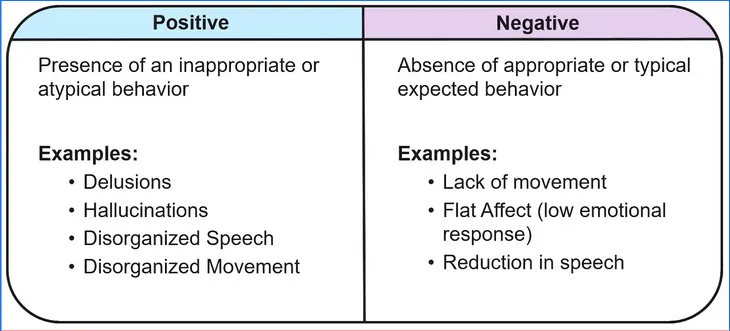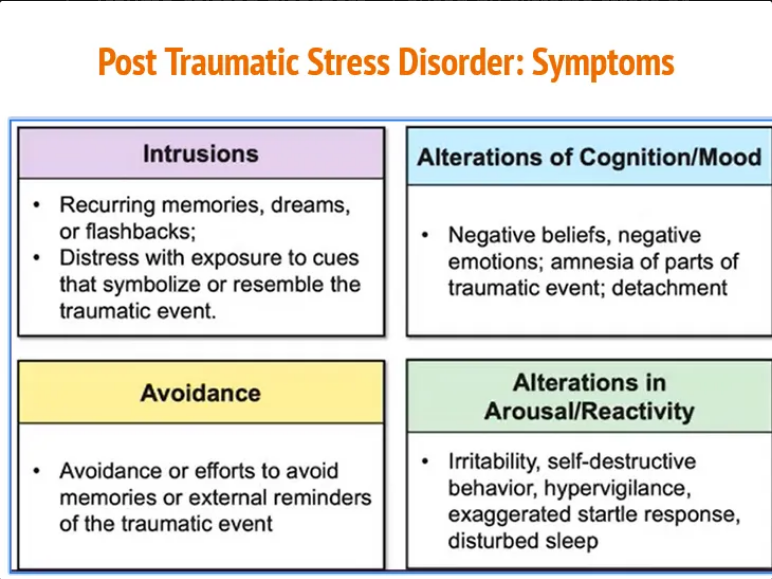Selection of Categories of Psychological Disorders
1/53
There's no tags or description
Looks like no tags are added yet.
Name | Mastery | Learn | Test | Matching | Spaced | Call with Kai |
|---|
No analytics yet
Send a link to your students to track their progress
54 Terms
Neurodevelopmental disorders
Begin in childhood, affect learning, behavior, or functioning
ADHD
Trouble paying attention, controlling behavior; no cure, but meds and therapy help
ASD (Autism Spectrum Disorder)
Trouble with communication, social skills, and repetitive behaviors; very different from person to person
Schizophrenia Spectrum
Involves delusions, hallucinations, disorganized speech/behavior, or flat emotion
Psychosis
Loss of contact with reality
Delusions
Strong, false beliefs.
Delusions of persecution - the belief that someone is being mistreated, spied upon, or harmed by others
Delusions of Grandeur - a belief that one is more influential, powerful, or important than reality
Hallucinations
Seeing/hearing things that aren’t there
Word salad
Jumbled, meaningless speech
Catatonia
Movement problems (frozen or strange movements)
Flat affect
No emotional expression
Catatonic stupor
No movement or speech
Negative vs Positive Symptoms

Dopamine hypothesis
Too much/little dopamine may cause psychotic symptoms
Depressive disorders
Ongoing sadness or irritability that affects daily life
Major Depressive Disorder
Severe depression for at least 2 weeks
Persistent Depressive Disorder
Milder symptoms lasting 2+ years
Bipolar disorders
Mood swings between highs (mania) and lows (depression)
Manic episode
Very high energy, elated or irritable mood
Depressive episode
Sad, hopeless, tired
Bipolar I
At least one manic episode
Bipolar II
Hypomania (less sever manic episode) + depression.
Cycling
Shifting between mood episodes
Anxiety disorders
Excessive fear or worry
Specific phobia
Fear of a specific thing (e.g., spiders)
Agoraphobia
Fear of open or crowded spaces
Social anxiety disorder
Fear of being judged by others
Generalized anxiety disorder (GAD)
Constant worry about many things
Panic disorder
Sudden intense fear or panic attacks
Panic attack
Sudden surge of fear with physical symptoms
Ataque de nervios
Cultural panic response (Latin cultures)
Taijin kyofusho
Fear of offending others (Japan)
Obsessions
Repetitive unwanted thoughts
Compulsions
Repetitive behaviors to reduce anxiety
OCD
Obsessions + compulsions causing distress
OCPD
Extreme perfectionism and control (not always distressing)
Hoarding disorder
Trouble getting rid of items, causing clutter
Dissociation
Disconnection from memory, identity, or reality
Dissociative disorders
Escaping reality in unhealthy ways
Dissociative amnesia
Forgetting due to trauma (not brain injury)
Fugue
Sudden travel or loss of identity
Dissociative Identity Disorder (DID)
Two or more distinct identities due to trauma
Trauma-related disorders
Caused by extreme stress or trauma
Hypervigilance
Always on alert
Flashbacks
Reliving a traumatic event
Insomnia
Trouble sleeping
Emotional detachment
Feeling numb or disconnected
PTSD
Lasting stress after trauma (e.g., war, assault)

Feeding/eating disorders
Unhealthy eating habits that harm health
Anorexia nervosa
Extreme food restriction, fear of weight gain
Bulimia nervosa
Binge eating followed by purging
these behaviors occur at least once a week for three months
Personality disorders
Long-lasting behavior patterns that are harmful or disruptive
Cluster A
Odd/eccentric behavior
Paranoid - pattern of distrust and suspicion
Schizoid - avoidance of social activity and interaction with others
Schizotypal - add ways of thinking, perceiving, and communicating
Cluster B
Dramatic/emotional behavior
Anti-Social - disregard for others with no remorse/guilt
Histrionic - excessive attention-seeking behavior
Narcissistic - inflated sense of self-importance
Cluster C
Anxious/fearful behavior
Avoidant - feeling of inadequacy and being socially judged; leads to avoiding interpersonal contact
Dependent - feeling of helplessness and a need to be taken care of and reassured
Obsessive Compulsive - excessively focused on order and perfection